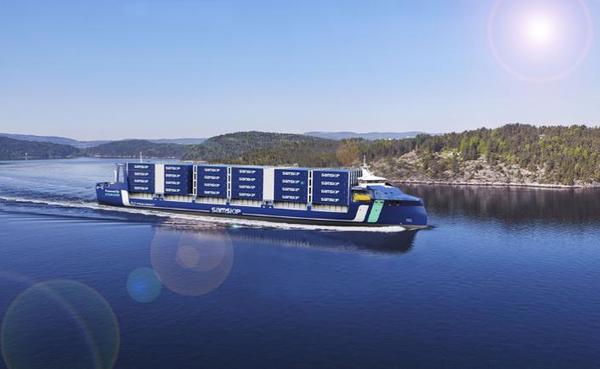Samskip sees 90% reduction in CO2 emissions using GoodFuels' biofuels
Dutch logistics company Samskip aims to save additional 45,000 mt of carbon dioxide (CO2) emissions by the end of this year by switching to biofuels in its shortsea shipping operations. PHOTO: Model of Samskip's 500 TEU remotely controlled container ship, SeaShuttle. Samskip
PHOTO: Model of Samskip's 500 TEU remotely controlled container ship, SeaShuttle. Samskip
The company has entered an agreement with biofuel supplier GoodFuels to supply its fleet comprising four containerships until the end of this year.
This comes after successful biofuel trials in 2019. The company commenced bunkering of its fleet with biofuels in Rotterdam with container ships Samskip Endeavour, followed by Samskip Innovator, Samskip Hoffell and Samskip Skatafell through 2022.
The biofuel blend offered 30% CO2 emission reductions but a switch to 100% biofuel last year led to the 90% cut in emissions, it says.
Samskip claims that the GoodFuels MDF1-100 biofuel can minimize carbon dioxide emissions by 90% compared to conventional fuels. MDF1-100 is produced from used cooking oils, which can now serve as raw materials for high-quality sustainable biofuels.
According to Erik Hofmeester, head of vessel management of Samskip, biofuels “offer a viable way” for its fleet and customers to “reduce their carbon footprint.”
The company is also negotiating a deal to extend the Goodfuels contract till 2023 covering its chartered vessels as well.
Biofuels are being explored by several shipping firms to lower near-term carbon emissions as these fuels can be blended with conventional fuels as drop-in fuels.
In this month, Germany-based cruise line Hapag-Lloyd Cruises successfully concluded trial run of a biofuel blend supplied by GoodFuels. Japanese conglomerate Marubeni Corporation has also concluded a pilot run of a biofuel blend onboard an ethylene carrier.
By Tuhin Roy
Please get in touch with comments or additional info to news@engine.online






